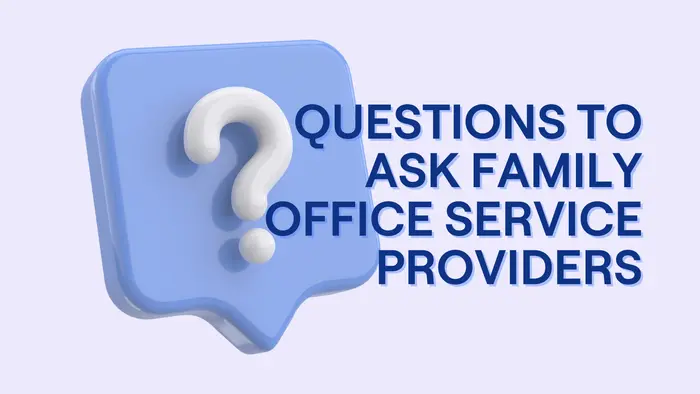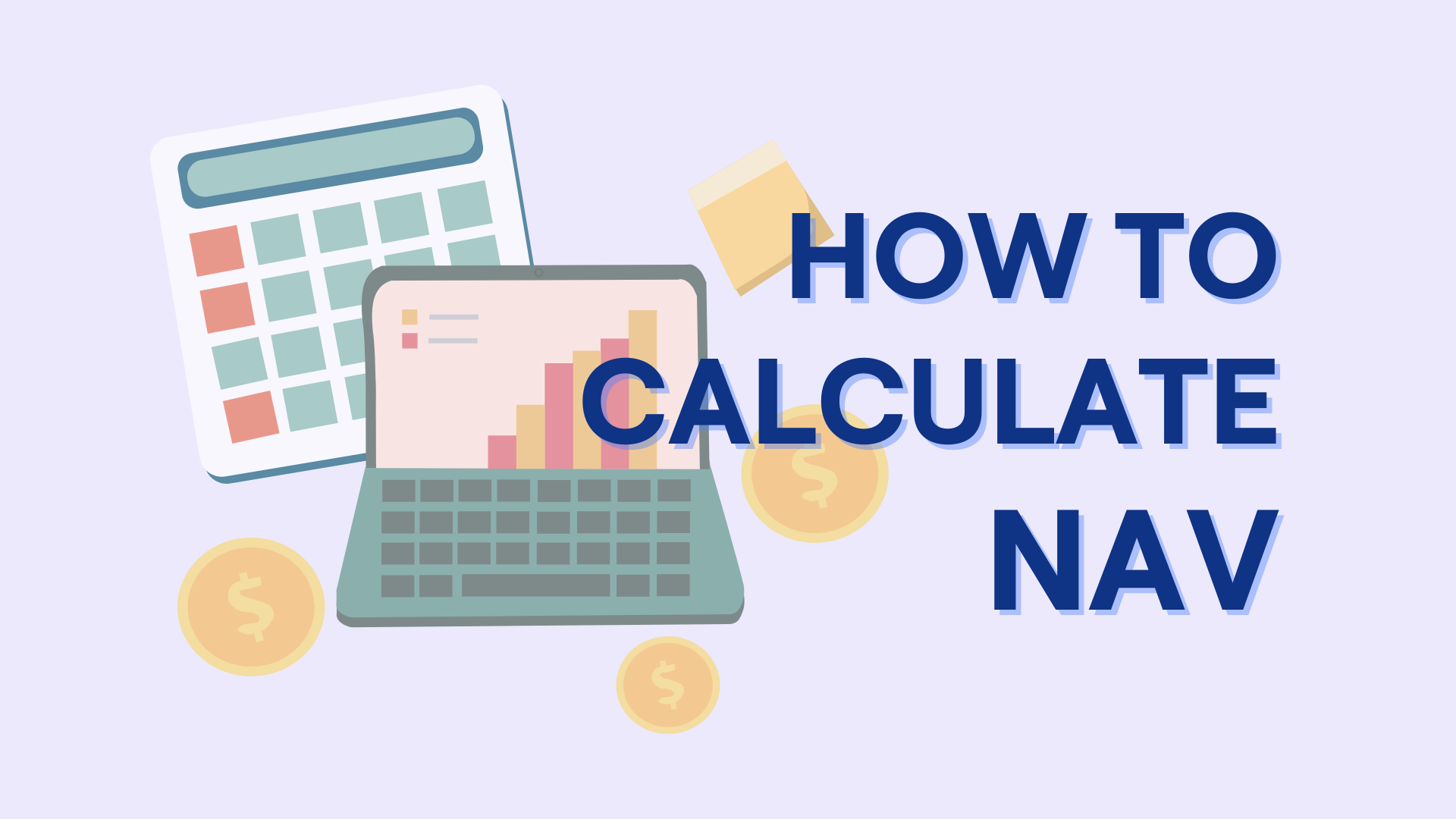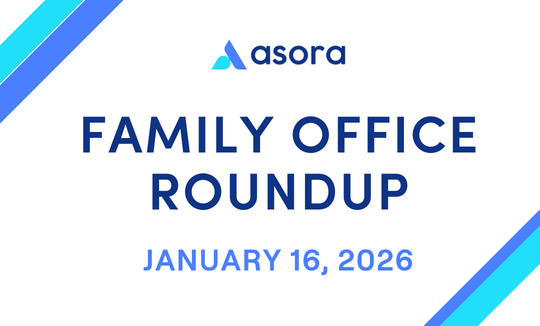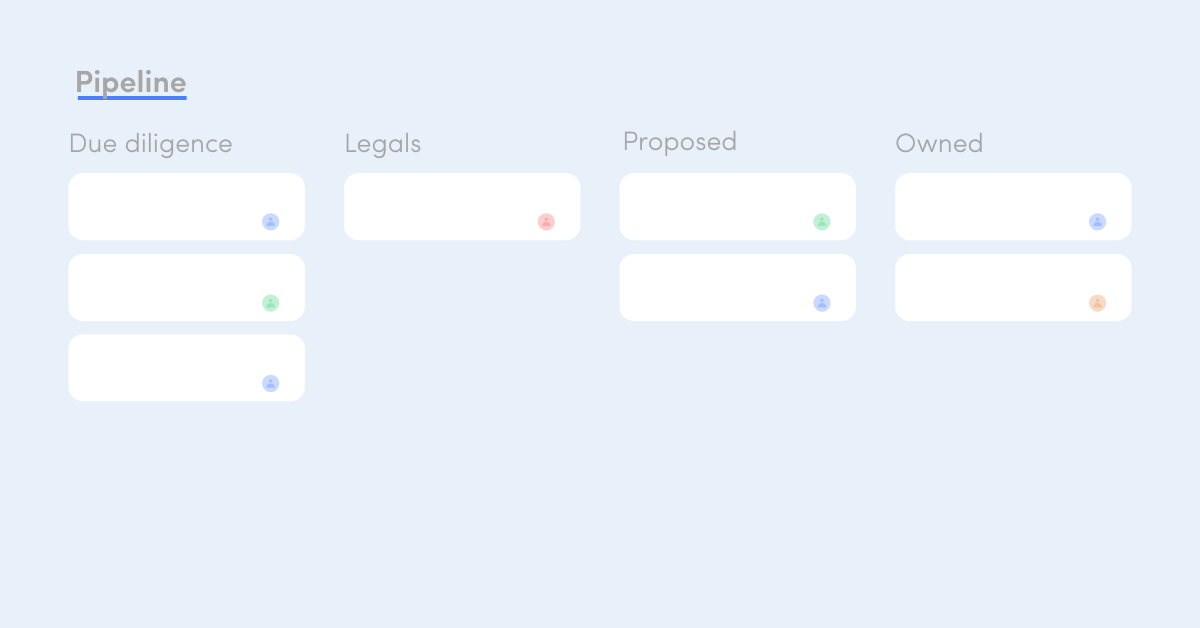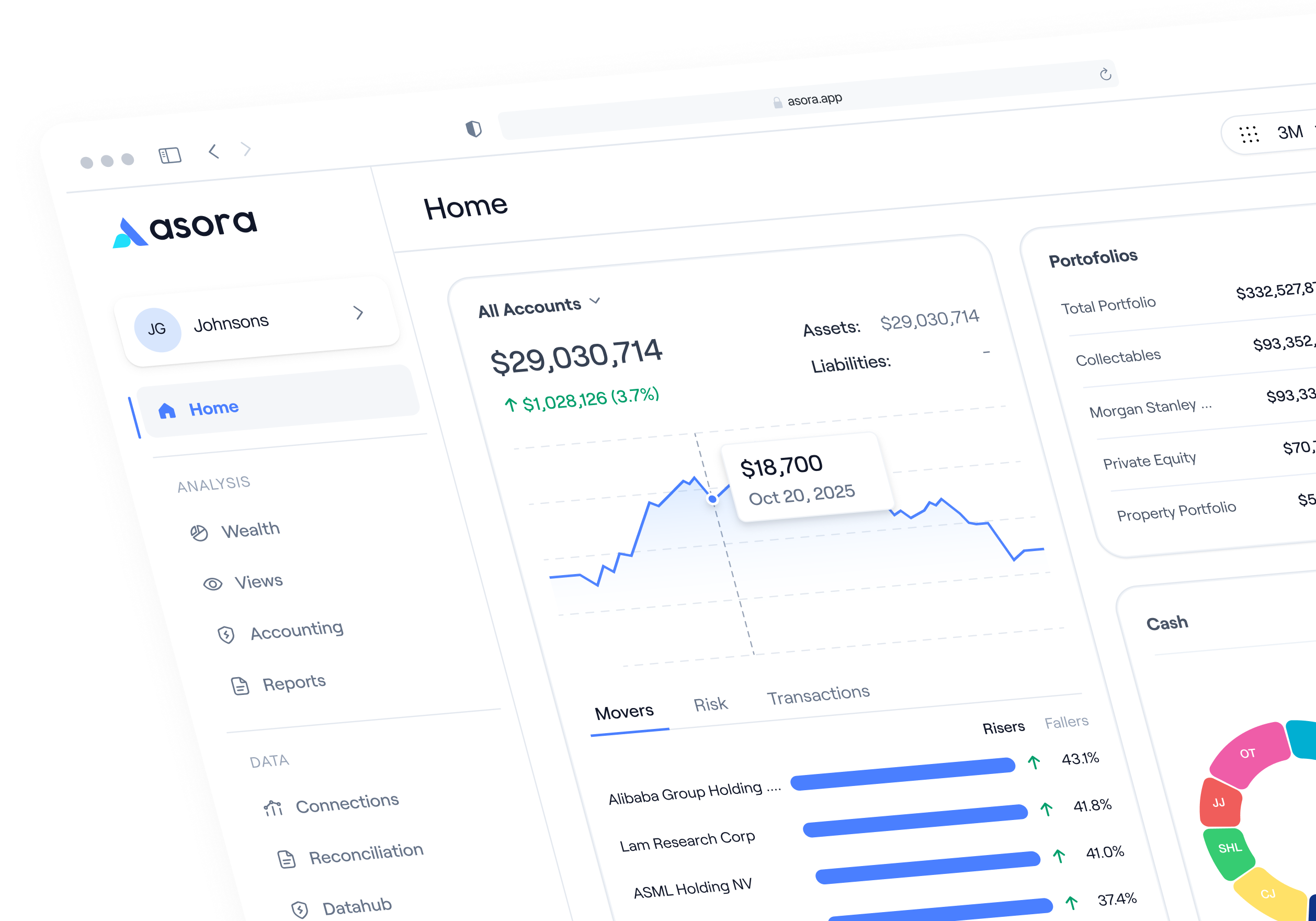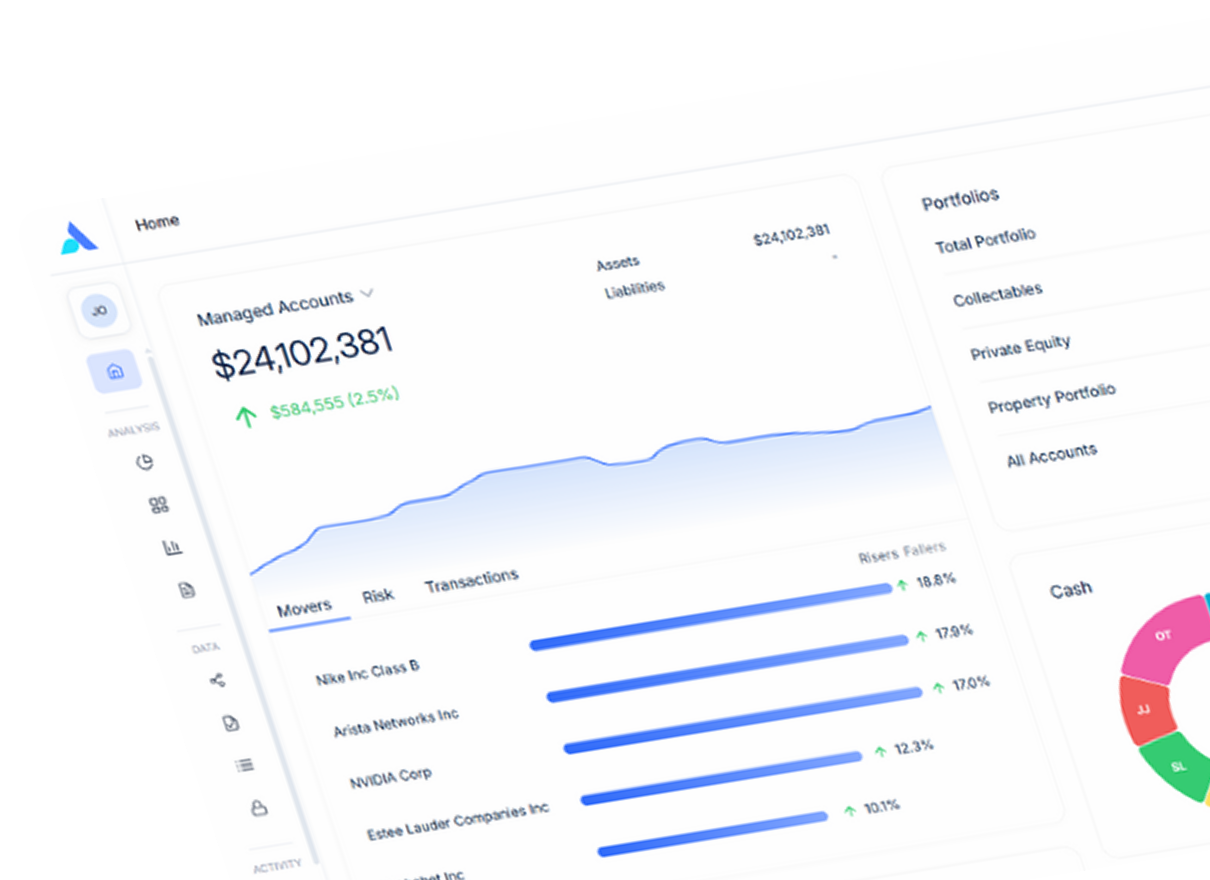Automate your family office
Schedule DemoHeading 1
Heading 2
Heading 3
Heading 4
Heading 5
Heading 6
Lorem ipsum dolor sit amet, consectetur adipiscing elit, sed do eiusmod tempor incididunt ut labore et dolore magna aliqua. Ut enim ad minim veniam, quis nostrud exercitation ullamco laboris nisi ut aliquip ex ea commodo consequat. Duis aute irure dolor in reprehenderit in voluptate velit esse cillum dolore eu fugiat nulla pariatur.
Block quote
Ordered list
- Item 1
- Item 2
- Item 3
Unordered list
- Item A
- Item B
- Item C
Bold text
Emphasis
Superscript
Subscript
TL;DR
Selecting a family office platform in 2026 is a strategic decision that impacts reporting quality, governance, day-to-day operations, and your financial goals, including your investment portfolio. The right provider must cover your complete asset scope across public and private markets, scale as assets, entities, and users grow, integrate cleanly with banks, custodians, accounting, and CRM systems, and meet rigorous security expectations with audited controls. Implementation support and training should be structured and responsive, with total cost reflecting transparent pricing and clear terms for data migration, feeds, and add-ons. Use smart questions to benchmark providers on scope, scalability, security, integrations, support, total cost, and verified outcomes.
Introduction
Family offices require a single source of truth that unifies liquid portfolios, private assets, documents, and workflows while preserving confidentiality across entities and generations. The choice of software influences how quickly teams can close the books, prepare reviews, and make allocation decisions, as well as how confidently principals and advisors access information. When platforms fall short, manual processes accumulate, reconciliation takes longer, and decisions slow. When platforms are well matched to the operating model, reporting becomes timely and consistent, controls are easier to enforce, and collaboration improves.
The seven questions in this guide provide a practical framework for assessing whether a provider can cover your entire asset landscape, scale without friction as complexity increases, integrate reliably with existing systems, protect sensitive data with independently audited controls, deliver effective onboarding and ongoing support, and substantiate claims with references and measurable results.
7 Questions to Ask Your Family Office Software Provider in 2026
1. What Range of Services Does Your Platform Actually Support?
You manage a comprehensive balance sheet that encompasses real estate, private equity, alternative assets, and distinctive holdings, such as vessels or aircraft, often for multiple generations with varying goals and risk tolerances.
Before you sign anything, map out everything your family office does today and what it might need tomorrow for effective financial planning.
- Does the software handle private wealth management alongside public markets?
- Can it support estate planning documentation and tax planning workflows?
- What about lifestyle management requests or charitable giving tracking?
The best family office service providers offer consolidated reporting, private asset tracking, document management, and workflows in one place. Avoid solutions that require multiple disconnected tools for core reporting, private assets, and documents.
2. Will This Software Scale as Our Family Office Grows?
Technology should not cap your operating model. As assets grow and structures become more complex, the platform must scale without performance loss, especially as additional family members require secure access.Scalability is about more than larger numbers. It includes:
- Supporting additional users without performance degradation
- Managing deeper and more complex entity structures
- Handling increased transaction volumes as strategies diversify
- Accommodating new asset classes with custom data points
Ask potential providers to walk you through real examples of how their platform scales. How do current clients with similar needs use the system? What is the largest family office they support, and what does that implementation look like?Scale scenarios to test in the demo, particularly those related to the investment portfolio :
- Add a number of entities and beneficiaries, and confirm that consolidation rules still hold
- Adding a new asset with relevant reporting
- Importing historical data and reconciling
Many family offices outgrow their initial technology choice within a few years. Validate scale now to avoid a disruptive re?platform later.
3. How Do You Protect Our Most Sensitive Data?
Given the sensitivity of financial, personal, estate, and strategy information, ultra-high-net-worth families should only engage providers operating under audited security frameworks with enforceable access and monitoring.
Don't accept vague assurances about family wealth security. Demand specifics about the financial services offered :
- What encryption standards do you use for data at rest and in transit?
- How is multi-factor authentication implemented?
- What third-party security audits have you completed recently?
- Are you ISO 27001 certified? GDPR compliant?
- What's your incident response plan in the event of a breach?
- How do you handle data backups and disaster recovery?
High-net-worth families, often referred to as wealthy families, are prime targets for cybercriminals. Your family office software should be built with security as a foundational element (not an afterthought).Evaluate providers for independently audited controls (e.g., ISO 27001 or SOC 2 Type II), MFA, encryption in transit and at rest, regular penetration testing, documented incident response, and defined backup/recovery RTO/RPO.
4. Can Your Software Integrate with Our Existing Systems?
No family office runs on a single piece of software. There are accounting systems, CRM platforms for relationship management, portfolio management tools, tax software, and probably a dozen other applications that keep your operation running.
Insufficient integration leads to duplicate data handling, reconciliation overhead, and avoidable errors that undermine confidence in reports.
Push providers on their integration capabilities:
- Do you offer pre-built connections to major accounting and investment platforms?
- Do you have certified or proven connections with major custodians/banks and accounting/portfolio systems?
- Is there an API for custom integrations?
- How do data feeds work with custodians and banks?
- Can the system import historical data from our current setup?
Robust integrations can provide you with greater control in private wealth management by reducing manual entry and reconciliation, enhancing data quality, and accelerating reporting and review processes.
5. What Support and Training Do You Actually Provide?
Adopting new technology can be challenging, even for tech-savvy teams. For family offices (where staff often have deep financial expertise but limited software implementation experience), it can be downright tricky.
Choose a provider who's committed to your decision-making and success, not just making a sale. That means a dedicated team for onboarding, hands-on training, and responsive support when (not if) you hit roadblocks.
Ask about:
- What does the onboarding process look like, and how long does it typically take?
- Do you provide dedicated support during implementation?
- What training resources are available for new users?
- How quickly do you respond to support tickets?
- Is there a customer success manager assigned to our account?
Many family offices that derive the most value from their technology are those whose providers treat implementation as a partnership, not a transaction. Working with Asora means having a team that understands family office operations and is invested in your success.
6. What's the True Total Cost of Ownership?
Unplanned fees often arise after a commitment is made for additional services, thereby increasing the actual cost. That attractive monthly price might not include customization fees, implementation costs, training charges, ongoing support, or add-ons for features you actually need. Ultimately, the cheapest option often becomes the most expensive when inefficiencies, errors, and the eventual need to switch platforms are factored in.
Get everything in writing:
- What's included in the base price?
- Are there implementation or onboarding fees?
- How much do additional users cost?
- What features require add-on pricing?
- Are there charges for data migration or historical imports?
- What happens when we want to add custodian connections or asset classes?
Asora offers transparent, tier-based pricing, with all core features included at every tier and unlimited users. Add-ons (e.g., advanced alternative asset ingestion) are clearly itemised.
7. Can You Share Real Examples of Success?
Prioritize providers who substantiate claims with audited results, references, and case studies in the context of wealth advisory.
Ask for references from family offices similar to yours. You want to see single family office or multi-family office operations managing comparable private asset levels. Talk to those references directly. Ask them about:
- What problems were you trying to solve when you chose this provider?
- How long did the implementation take?
- What's been better than expected?
- What's been more challenging than anticipated?
- Would you make the same choice again?
Real case studies tell you what to expect. For example, Capstone Family Office reduced its reporting time from days to under 10 minutes with Asora. A family trust saved around 80% of the time spent manually gathering data.These aren't marketing claims but real outcomes from real family offices.
Make the Right Choice for Your Family Office
Don't rush this decision. The right platform will serve your family for years and become the foundation of your wealth management infrastructure. Making the wrong choice will cost you time, money, and opportunities.
Asora was explicitly designed for single family offices and multi-family offices seeking modern, secure, and comprehensive wealth management software. We help families track everything from liquid investments to real estate and private equity, all in one platform.
If you would like to see how Asora can work for your family office, schedule a demo and bring your most challenging questions.
Frequently Asked Questions
How should a family office choose a software provider in 2026?
Ask each vendor to show your real-world fit, not a generic demo. Have them use a sample of your entities, custodians, and private assets to build a consolidated report in the session, including one regional bank feed and one private asset workflow. Confirm what's in scope on day one, the timeline with milestones, who handles data cleansing and ongoing mappings, and how support works. Request an all-in cost covering license, implementation, feeds, users, and quarterly operations to compare total cost of ownership. Finally, verify security with certifications like ISO 27001 or SOC 2 Type II, require MFA and SSO, and get backup and recovery details in writing.
Which services matter most when choosing a family office software provider in 2026?
Prioritise capabilities that reduce manual work and surface the full picture: data aggregation across banks/custodians, performance (TWR/IRR), accounting (book values, gains/losses, lots), private asset workflows (capital calls, distributions), document management, workflow support, and mobile access. Map each capability to a real use case like creating quarterly packs without Excel stitching. For SFOs with 5–50 entities and significant alternatives, coverage of non-custodied assets is essential.
How much does family office software typically cost?
Family office software pricing depends on long-term assets tracked, features, and service level required. Most providers charge a monthly subscription based on AUM or a flat fee. Expect monthly costs from $1,000 to $10,000+. Watch for hidden costs like implementation, user limits, or custodian fees. Asora starts at $900/month for under $30M in tracked assets, includes unlimited users, and offers clear add-on pricing.
What's the difference between single family office and multi-family office software needs?
Single family offices need tools that manage complex entity structures, custom reporting, and governance. Multi-family offices require scalable infrastructure, client segmentation, and strong privacy controls across families. Each type of office has unique technology demands based on operational complexity and reporting requirements.
How long does it take to implement family office software?
Implementation timelines range from 4–6 weeks for clean, simple setups to 3–6 months for complex implementations involving historical data, multiple custodians, and extensive customisation. Dedicated onboarding support helps ensure a smooth transition and faster ROI.
What security certifications should family office software have?
Look for ISO 27001 certification as a baseline for information security. GDPR compliance is essential for handling European data. SOC 2 Type II offers further assurance of internal security controls. Platforms should provide end-to-end encryption, MFA, regular penetration testing, and clear backup and disaster recovery protocols.

